26 non-negotiable sales skills every salesperson should have
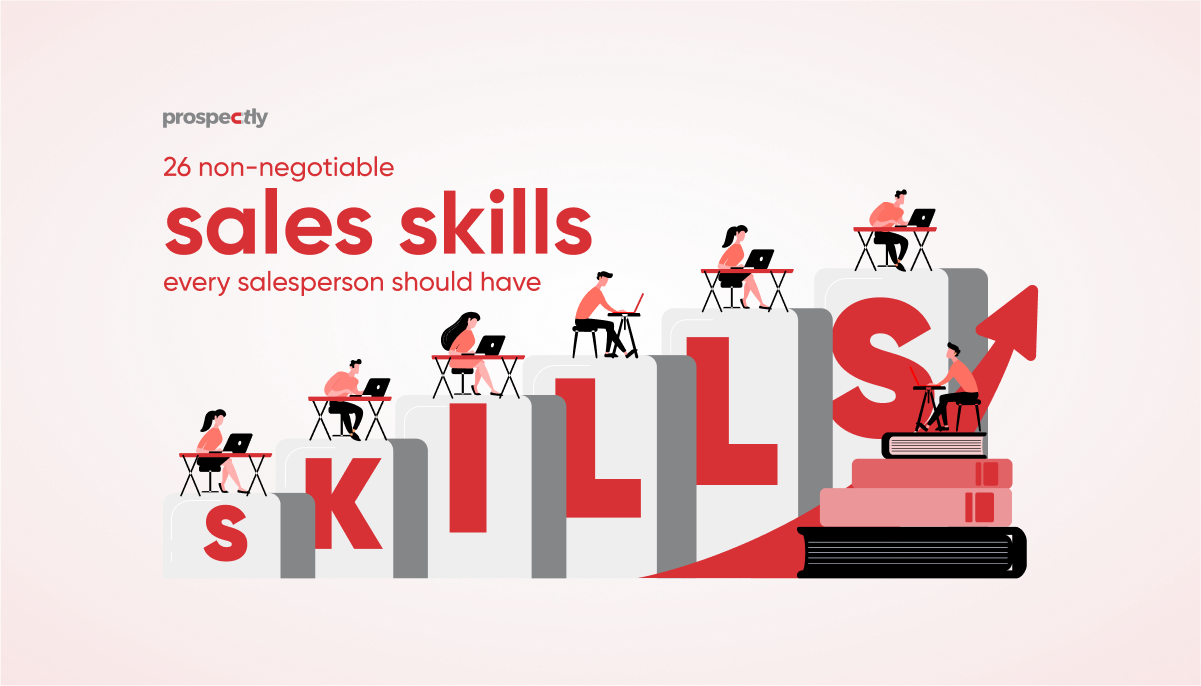
They say “sales is not for the faint of hearts”. The stakes are even higher in today’s unpredictable economic climate. However, selling skills can also be trained and developed like all skills. This blog will summarize the most crucial sales skills to help you stand out amidst the cutthroat competition.
But before we decode these vital sales skills, let’s look at the definition and its various types.
What are sales skills?
Sales skills are a set of crucial competencies that shape a novice sales rep into an adept salesperson. To be efficient in sales, you will need just the right balance of diverse characteristics.
You require a competitive streak that helps you win deals, technical skills to keep up with your digitally-savvy clients, and an altruistic nature that inspires you to address customer pain points. However, you also need to develop explicitly role-based skills.
Based on the above criteria, we have divided selling skills into four categories – hard sales skills, soft sales skills, position-specific sales skills, and digital sales skills. Let’s explore these four groups individually.
Top 26 selling skills for a sales representative
Hard sales skills
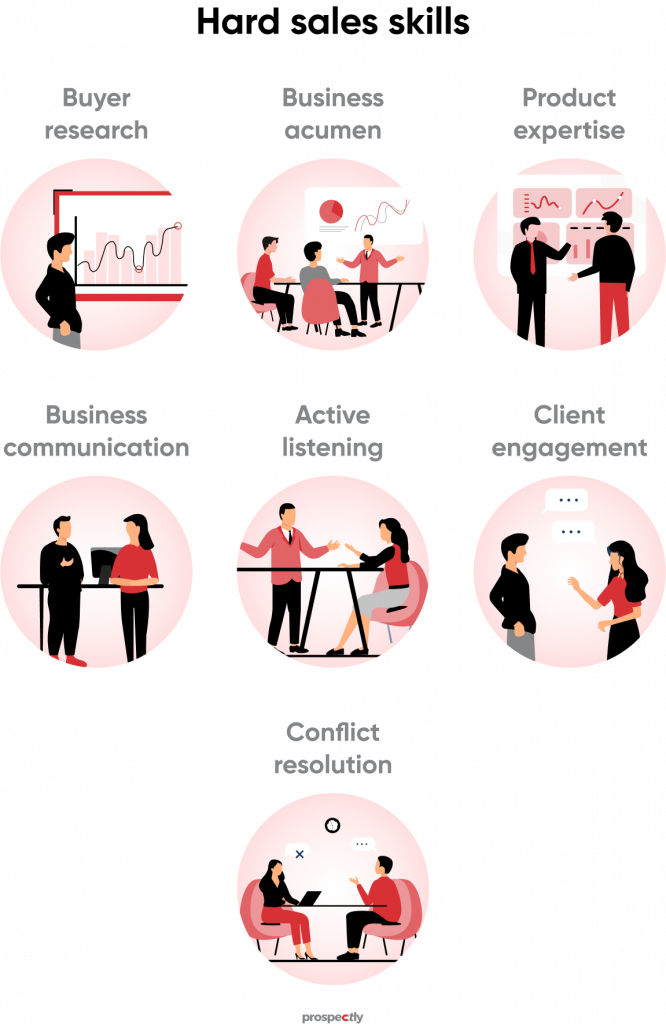
Hard skills are abilities that demonstrate your product expertise, industry knowledge and help you win more deals. Here are the primary ones that fall into this category.
1. Buyer research
Keeping a finger on your customer’s pulse requires staying abreast of industry trends. Moreover, following and studying your prospect’s activity will help you deliver tailored solutions. Here are a few pointers.
- Use your CRM and other data analysis tools to know your customer and their company.
- Monitor your targets on social media and consume industry information via sources like news articles, newsletter subscriptions, public financial documents, competitor websites, etc.
2. Business acumen
Do you think business acumen is essential for sales success? Most definitely! Your role should be more than a commodity seller but rather a strategic advisor for your clients. Go the extra mile by applying industry context and business-level information (like an annual financial report) to address your customer’s pain points.
But how do you build this skill?
- Consistently reach out to internal subject matter experts or senior management. You can also seek advice from thought leaders on your social network.
- If available, take company-sponsored training and courses on related topics.
- Refer to external training sources like seminars, conferences, etc., for topical and sector-specific updates.
3. Product expertise
Convincing a prospect to choose your product/service is not an easy feat. It becomes even harder to accomplish if you are not well-versed with your/your company’s offerings. Besides, no matter how proficient your people skills are, you will have nothing to say without product knowledge.
Comprehensive knowledge of the benefits, USPs, recent developments and even shortcomings of your product/services is crucial for delivering stellar sales pitches, answering client queries, and finding the right solution for your customer. You can expand your product knowledge with the help of in-house training sessions or collaborating with other functions like product teams, marketing teams, etc.
4. Business communication
Being in sales requires you to be an effective communicator across all channels. Whether on emails, phone calls, social media channels, or presenting in front of a group – honing this skill will take you places. Irrespective of your product knowledge, you will be unable to convince your customers if you cannot deliver your message with clarity. Training and routine practice will help you master your business communication skills.
5. Active listening
To build rapport with your clients, communication and active listening go hand-in-hand. A Rain Group study states that only 26% of buyers consider sellers competent listeners. This gives you a solid reason to practice active listening.
Consider the following directives outlined by HubSpot to harness your listening skills.
- Truly listen to what your customer is saying by observing their language, tone of voice, facial expressions, and body language. Instead of waiting for a chance to prove your point, make an effort to understand their plight, encouraging your prospects to open up more.
- When a prospect describes what they are looking for or their challenges, feed it back to them so they can hear it from you. You can do this by reiterating, paraphrasing, or putting it in your own words.
- After paraphrasing, confirm if you have heard them correctly. If you have not, request clarification.
- Ask relevant follow-up questions and keep them open-ended to encourage them to share more about their goals, challenges, and current plans.
6. Client engagement
Along with effective communication and active listening, client engagement is essential in building sustainable business relationships. Learning the science behind engaging clients comes in handy throughout the sales cycle. For instance-
- Honing your cold calling skills gives you the confidence to speak with challenging prospects.
- Leading with discovery questions inspires customers to open up about their goals, challenges, and business needs.
- Industry and buyer research will help you engage customers with relevant information.
7. Conflict resolution
If you are a seasoned sales rep, facing and resolving conflicts will be your second nature. High-performing salespeople do not think of objections as rejections, but as opportunities to close a deal. Also, while handling disputes, it is vital to be proactive and try to uncover the underlying cause of the objection.
To learn more about the art of conflict management and resolution, read our comprehensive guide on objection handling.
Soft sales skills
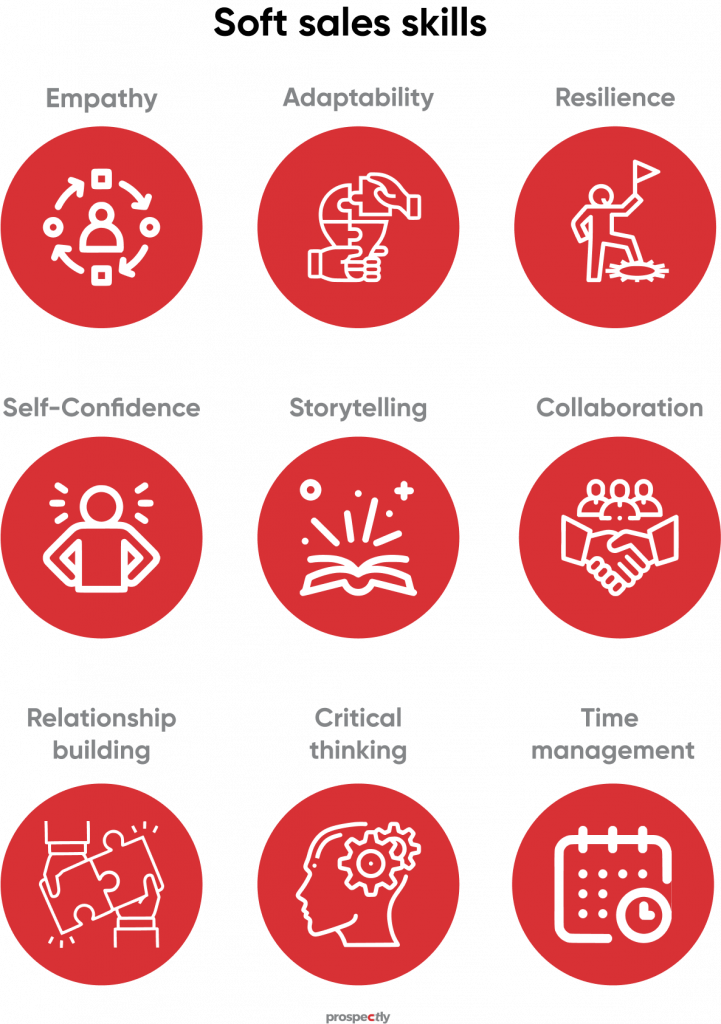
Soft skills are interpersonal traits that help you deliver exceptional customer service while addressing client concerns. Contrary to the hard skills which are pretty tactical, soft skills focus on your approach towards customers.
Let’s take a look at some of the soft skill examples.
8. Empathy
Sales is an inherently human activity, regardless of your selling skills or your product’s efficacy. To connect with your customer personally, you need to have the emotional intelligence to understand where they are coming from and explore the crux of their challenges.
However, like any skill, you can develop empathy. Start practicing compassion in your day-to-day life by paying attention to people’s verbal and non-verbal cues. Acknowledge your target’s point of view and try to propose buyer-centric solutions based on the prospect’s emotional state.
9. Adaptability
Darwin’s theory ‘Survival of the fittest’ holds true in sales as well. A salesperson’s ability to adapt to uncertainty can help them navigate rough weather.
For instance, the economic uncertainty brought forward by covid-19 and recurrent lockdowns posed a severe challenge to the people-focused sales domain. Like many professions, salespeople too had to adapt to the realities of a remote working environment to survive the economic catastrophe.
10. Resilience

In sales, resilience can be your greatest strength amidst frequent disappointments. Research indicates that on average, it takes 18 dials to connect with a prospect and only 23.9% of sales emails are opened. Among such thin odds, only the ones with unwavering grit and resilience can climb up the professional ladder.
11. Self-confidence
When you think of a salesperson, you picture someone who exudes confidence. That is because the ability to convince complete strangers to trust your product/service requires high self-confidence.
If you have spent a few years in sales, you can gain confidence from your success stories. If you are new, study your product/service, client, and the market landscape to develop confidence in yourself and your offering.
12. Storytelling
Brands have been harnessing the power of storytelling for ages to connect with their audience. Articulating how your product/service fulfills your prospect’s requirement in the form of a story makes it engaging and authentic. Furthermore, showcasing client case studies from similar industries will help affirm your prospect’s faith in your brand.
13. Collaboration
Selling is not a one-person job and usually demands collaboration between multiple teams. Even externally, you may deal with various stakeholders responsible for completing the transaction. As a salesperson, it becomes your job to successfully orchestrate the workflow of different internal and external teams into serving a common goal.
14. Relationship building
Relationship building is a crucial task for sustaining mutually beneficial alliances. Particularly in high-ticket B2B transactions, customers want to come back to a vendor they trust. Building rapport with your clients helps you navigate the buying process more efficiently.
15. Critical thinking
Like most professions, critical thinking is an integral part of selling. A salesperson with problem-solving skills can –
- Process complex information by sorting through heaps of data to ideate the best possible solution for their client
- Pinpoint the actual reason behind objections and brainstorm creative ways to close the sale while servicing the client.
16. Time management
The adage ‘time is money’ is even more accurate in the sales function. Making the most of your buyer’s time and your own is a critical skill to have for closing more deals.
Below are a few ways to optimize your time in sales.
- A methodical salesperson knows the value of those precious calling hours and is particular about leveraging them by avoiding non-revenue generating tasks.
- Time-critical tasks like responding to client queries should take precedence over operational functions like updating your CRM. This results in increased productivity and thus more significant sales.
- When you value your client’s time by preparing well for meetings and presentations, they take you seriously, which shortens the sales cycle.
- Utilizing sales tools that automate operational tasks leaves you more time for selling.
Role-based sales skills
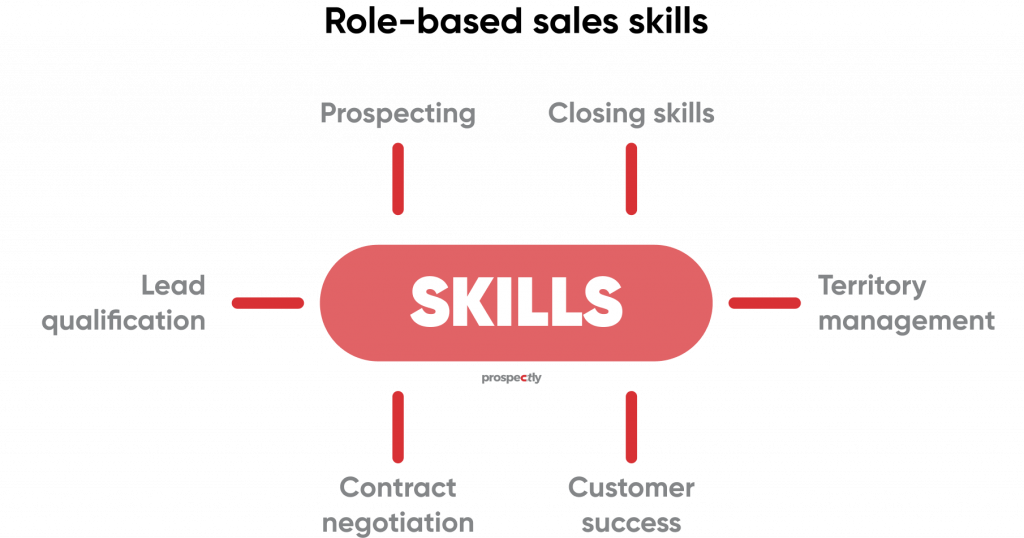
As mentioned earlier, sales is a team effort, and every stage of the sales process requires the involvement of a specialist. This is true, especially in larger organizations. Here are some trainable skills based on your role within the sales team.
17. Prospecting
Prospecting is finding and reaching out to your ICP (Ideal Customer Profile). It involves comprehensive research on your end to identify the top traits of your ICP and their business needs. For your prospecting method to be effective, you need a strategic approach that can be built into your daily activities.
Pro tip: Read our blog on Sales Prospecting to get a detailed understanding of the various techniques, processes, and tools of prospecting.
18. Lead qualification
After prospecting, the next step is to qualify those prospects by determining their probability of closing. This is often the most challenging part of sales, as selecting the right prospect can drastically reduce buying timelines. A few things to keep in mind while prospecting are-
- Determine the characteristics of a qualified prospect based on historical data, like buying signs, budget, target industry, etc.
- To quantify these characteristics, create qualifying questions that help you assess their potential.
- Learn when to disqualify a prospect. It will save you countless hours chasing futile opportunities.
- Follow a lead qualification framework like BANT (Budget, Authority, Needs, and Timeline), CHAMP (Challenges, Authority, Money, and Prioritization), MEDDIC (Metrics, Economic Buyer, Decision Criteria, Decision Process, Identify Pain, and Champion), ANUM (Authority, Need, Urgency, and Money), etc.
Related: Your key to success: Sales lead qualification
19. Contract negotiation
Honing your negotiation skills is essential in all stages of the sales cycle, but negotiating the contract is what seals the deal. Budgetary constraints can make or break a sale. An ideal contract negotiation strategy helps you find a middle ground that is satisfactory to you and your client.
20. Closing skills
Generally, senior team members handle deal closures. But if you want to grow in sales, it is best to have a few tricks up your sleeve for effective deal-closing techniques.
- Assumptive close requires you to develop a positive outlook from the beginning of the sale. You can also feed it back to the client by reconfirming if you are in line with their requirement multiple times throughout the sales cycle.
- Question close applies to asking probing questions that aim to eliminate sales objections.
- The Now or Never close offers a unique benefit to customers in lieu of swift closures.
- In a Soft close approach, you subtly state the benefits without making any demands. This removes the pressure on their end and gives you more time to understand their core requirement.
- If your client disagrees with the price, use the Take Away close wherein you remove a feature or service for the discounted rate.
- Summary closes apply the technique of reiterating the purchase terms in the hopes of getting an answer from the client.
- Analytical close offers prospects comparative features or benefits. You can show them the pros and cons of different vendors or product functions.
21. Customer success
A strong customer success team is key to securing repeat business, cross-selling and upselling opportunities. During the sales cycle, take the time to know your clients by asking meaningful questions to discover customers’ pain points. You may have customer support teams for post-sales service. But smart salespeople will aim to nurture relationships by keeping in touch with clients and making sure they receive excellent post-sales support.
22. Territory management
Territory managers are responsible for ensuring sales efforts in their assigned territory run smoothly. They will need to study and track the market dynamics of their region and deliver customized sales pitches accordingly.
Digital sales skills
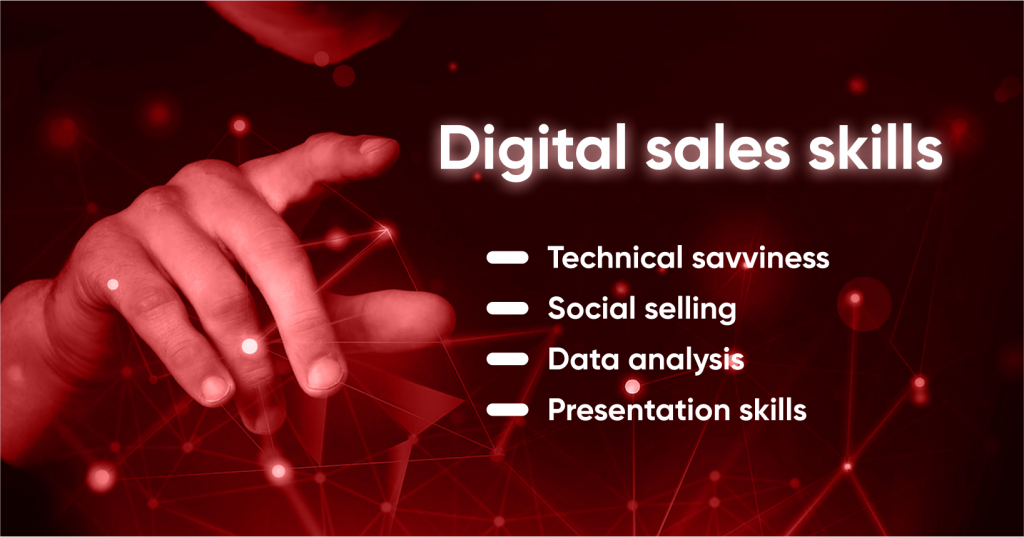
In today’s 24*7*365 digitally connected world, we would be amiss if we did not include digital skills in the list of critical sales skills. To survive the online sales revolution, you need to keep up with dynamic technological advances apart from sharpening your basic selling skills.
23. Technical savviness
According to Gartner, 75% of B2B companies will utilize AI-guided selling solutions by 2025. Hence technically sound salespeople have the edge over their peers who are not comfortable navigating technology. The rapidly advancing capabilities of AI can assist you in enhancing sales processes, unraveling complex challenges, and elevating your performance. From demand generation to sales forecasting, sales tech has integrated itself into all stages of the sales cycle.
To learn more about leveraging artificial intelligence to succeed in sales, check out our blog- The compelling impact of artificial intelligence in sales.
24. Social selling
B2B social selling capitalizes the power of your social media accounts like LinkedIn, Facebook, and Twitter to connect directly with your prospective customers and promote your product/services. Irrespective of your company having a separate social media team, it bodes well for you to nurture client relationships online.
Our comprehensive guide on social selling offers additional strategies for social media selling.
25. Data analysis
Making informed and calculated decisions by analyzing data is yet another digital sales skill that has become increasingly essential for salespeople. Use your CRM data to determine the right course of action instead of relying on your gut instinct for making analytical conclusions. Additionally, AI-based tools can procure historical data and records of client interactions to determine your ICP or forecast revenue.
26. Presentation skills
Delivering a flawless presentation requires practical communication skills with a touch of digital know-how. Familiarizing yourself with digital presentation tools and data-backed research will help you present winning sales demos. A few things to make your sales presentation lively and interactive are-
- Customizing the sales deck with client data
- Making it engaging by including chatter polls, transitional questions, and multiple visual elements
Summing up

Now that you have gone through this exhaustive list of sales skills based on these four prime categories, time to get into action. Whether your job mandates proficiency in hard or soft skills, you can get better at them by incorporating them into your daily routine. Pick out the role-based skill you currently need or the role you aspire to have. However, digital sales skills are sacrosanct should you wish to further your career in sales.




